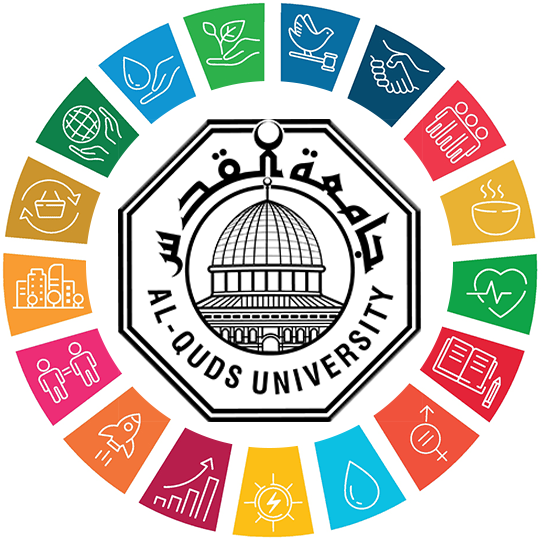SDG 2 (Zero Hunger) Progress
In 2025, Al-Quds University keeps on upholding its pledge to SDG 2 (Zero Hunger) by continuing to integrate education, research, innovation, and community service. Following the expansion of the university’s agriculture, food sciences, and nutrition programs to include sustainable food systems and climate-smart agriculture, the university has become more focused on training students to handle Palestine and the region’s emerging food security issues.
Innovation in food production, as well as soil and water management and overall agricultural sustainability have been the leading focus of Al-Quds University research centers. Recent focused research work has incorporated the use of advanced farming tools and strategies— smart irrigation systems, soil reclamation, and post-harvest systems— to boost agricultural productivity and resource conservation in the recent focused research work.
Al-Quds University has increased training of local farmers, cooperatives, and agribusinesses on food security and self-sufficiency. This is to help in the increase of responsible practice that include organic farming, reduced use of pesticides, and improved water use.
The Al-Quds University community nutrition programs has community nutrition programs that works to alleviate malnutrition in at risk populations and promote healthy eating. These outreach programs include nutrition workshops, food distribution to at risk populations, and campaigns that promote the use of local food and emphasize eating healthy.
Al-Quds University engages with innovative sustainable food systems and emerging practices like vertical integration of farming systems, precision farming, and the cultivation of alternative proteins. Practicing innovations in the university shows the proactive development of resilient and equitable food systems focusing on the ever-changing dynamics of climate change, population increase, and the diminishing availability of vital resources.
The number of hungry people has an unacceptable high even with successful economy around the globe, Goal2 calls for end hunger and ensure food access by all people, in particular the poor and people in vulnerable situations including infants, and supply them with safe, nutritious and sufficient food all year round.
Al-Quds University will continue to combat hunger and promote food security through action within its educational pillars, research, and outreach. The University contributes to the second of the UN Sustainable Development Goals in the following ways:
• collaborative seasonal food box distribution
• sponsoring 90 orphan children
• sponsoring and caring for more than 50 cases of children with special needs
• Producing more than 50 tons of organic agricultural products (vegetables, fruits, herbs) from the university’s private farms, benefiting poor families in the local community.
• organizes workshops, conferences, and scientific research at the College of Agriculture and Veterinary Medicine, providing local farmers with knowledge, agricultural extension and sustainable farming practices.
• accessible scientific agricultural services and advisory agricultural extension programs.
• assistance and local product purchase.
• implemented policies aimed at minimizing food waste.
• affordable annual food product exhibitions for all citizens (meat, milk, dairy, fruits, vegetables, etc.)
• through research, projects, and advocacy assistance in the prevention of land degradation, desertification, and land preservation.
Teaching Agricultural and Food Sciences: The University offers degree programs in the science and practice of agriculture, food, and other related disciplines. This provides budding professionals with the capacity to devise solutions to challenging problems in the food security domain. Instructional programs dedicate attention to the management of sustainable agriculture, processing of food, management of crops and livestock, and many other related disciplines.
Food Security and Nutrition Research: Al-Quds University performs research on various aspects of food security and nutrition including, crop production, soil fertility, water management, and post-harvest. This research feeds into the articulation of the streams of work around agricultural productivity, food quality and safety, and the reduction of loss and waste throughout the food supply chain.
Engagement with Local Farmers and Food Producers: Al-Quds University extends its outreach programs to local farmers, food producers, and agricultural associations within the context of the promotion of sustainable farming and food security. Outreach through workshops, training, and consultations aim to ensure farmers are supported to achieve increase crop production, improve soil health, and use sustainable farming practices.
Al-Quds University participates in community-defined nutrition programs that focus on minimizing malnutrition with an emphasis on children and pregnant women as at-risk groups. Interventions include nutrition education, food aid, and advocacy for the consumption of locally grown food with high nutritional value.
Al-Quds University collaborates with community agriculture stakeholders on the implementation of food security initiatives, sustainable agricultural practice adoption, and the conservation of community resources. Community members are involved in training programs, and the University’s personnel engage in on-farm consultations for sustainable crop production and environmentally sound agricultural practice adoption.
Innovation in Sustainable Food Systems: The university examines research and innovation in sustainable food systems including vertical farming, precision agriculture, and alternative proteins. Al-Quds University nurtures innovation in food production and distribution in order to develop more resilient and sustainable food systems that will better meet the challenges of climate change, population growth, and resource availability.
Advocacy and Policy Development: Al-Quds University engages in initiatives to develop and promote strategies and policies that respond to food security and hunger on the local, national, and global scales.
The local direct support initiatives from the university include:
As mentioned previously, Al-Quds University is committed to accomplishing SDG 2 through engagement in multiple disciplines, including education and research, as well as the integration of order influence and advocacy, community work, and innovation in policies. Al-Quds University contributes to the fight against hunger and advocates for a future that is more sustainable and food secure for everyone, all while collaborating with local communities and stakeholders.
